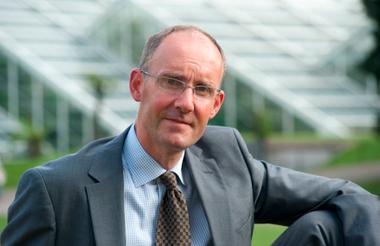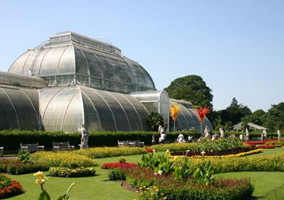Twenty years ago, Richard Deverell’s interest in conservation and science led him to become a trustee at the Royal Botanic Gardens (RBG), Kew.
He enjoyed sitting on the charity’s board for six years then before leaving in 2009.
But three years later, he returned to RBG Kew, leaving a two-decade-long career in broadcasting to become the charity’s 17th director.
“When the previous director, Stephen Hopper, stepped down in late 2011, I was curious about the role,” he says.
“I was surprised when the then-chairman Marcus Agius decided that they would consider non-scientists in the role (people who weren’t professors of botany or plant science), which all of the previous directors had been.
“The reason they were willing to cast the net a bit more widely was that Kew had all sorts of business, financial and staff challenges so they were willing to consider a more general leadership figure, rather than just restricting their search to an eminent scientist.”
Providing science leadership
The first thing Deverell did when taking up the role was to appoint someone to provide the science leadership he lacked at the charity.
“I made a number of changes to the structure, but the most important was we appointed professor Kathy Willis from Oxford University as director of science and we brought the three science departments together. So, for the first time, scientists had dedicated and focused leadership.”
Science is the largest part of the charity, Deverell says, but “a lot of people don’t realise that”.
“They think of Kew – quite properly – as a botanic garden and botanic collection, the heritage landscape. But behind the scenes, science is the biggest single department, with about 500 people in it, including a permanent research base in Madagascar.”
In 2021, RBG Kew published a strategy for the decade to 2030, which sets out five priorities “to understand and protect plants and fungi for the well-being of people and the benefit of all life on Earth”.
Deverell says: “One of the things we’re trying to do is create a great sense of urgency. Kew is trying to align everything we do to develop and deliver solutions to the twin challenges of biodiversity loss on the one hand, and nature-based solutions to climate change, and they’re interwoven.
“Using the strategy, we identified those five priorities – the biggest is science-based solutions. So, there’s a series of actions we’re trying to do, all of which are around developing and delivering solutions to those twin global challenges.”
For instance, RBG Kew’s scientists have been leading a conservation programme in Madagascar, thanks to a £10m in grant funding awarded by the Department for Environment, Food and Rural Affairs (Defra), “to develop a sustainable landscape management model for community-led forest conservation, carbon storage and livelihoods enhancement”.
‘A turbulent three-four years’
As a charity that has historical and contemporary links across the world, Brexit introduced a lot of uncertainty for RBG Kew.
At the time of the referendum in 2016, RBG Kew had over 100 staff and students from overseas, with the majority being from the EU, and still a “high proportion” of European nationals in its science department in 2020.
Deverell says Brexit has made it more difficult for the charity to hire staff, particularly in catering and in its science project.
“Many of our scientists are European nationals and the visa picture is harder and more complicated now for our scientists.”
He says Brexit has also made it more challenging to access materials. “We’ve had a number of construction projects delayed because of the import and export of materials.”
In response to the Covid-19 pandemic, RBG Kew “took the difficult decision” to close its gardens for the first time in its history for about 10 weeks.
The pandemic presented an “immediate financial challenge” for the charity which saw “a very sudden drop” in its visitor-related and membership incomes.
Recent accounts show that income from admissions fell from £11.9m in 2019-20 to £4.8m in 2020-21 before recovering to £8.5m last year. Meanwhile, membership income went from £7.5m to £6.8m before rebounding to £8.3m.
“A lot of staff were furloughed and we cancelled or delayed a lot of programmes and projects,” Deverell says.
“Our immediate concern in that area was financial health and the sustainability of the organisation. We were fortunate that we had built up our reserves.
“It was quite a complex and constantly changing picture. For about 16 months, we didn’t fully reopen so there was a long period of disruption.
“We had hoped that there’d be quite a quick bounce back after Covid-19 but then we bumped into all the problems associated with Ukraine, the inflation, and Brexit hasn’t helped as well. So, it’s been quite a turbulent three-four years.”
‘We need to make Kew more accessible’
In January last year, RBG Kew introduced a £1 ticket for anyone in receipt of Universal Credit, Pension Credit or legacy benefits to make its sites “more accessible to a greater number of people”.
Deverell is proud of RBG Kew’s work in this area but says the charity needs “to make more people aware of it”.
“We need to get word of mouth out there, so we’re working with our two local councils, Hounslow and Richmond, to try and promote it,” he adds.
“My hope is that we have 100,000 people a year visiting on this in a few years’ time. We do have more people visiting – we’ve sold 40,000 of those tickets so far – and I’m confident the vast majority of those are people who wouldn’t have visited Kew were it not for the £1 ticket.
“It’s an important step in the right direction directly aligned with our strategy. We’re a charity, we’re partly funded through taxpayers so we should be accessible to everyone. But we’re also aware that the £1 ticket doesn’t catch everyone who finds Kew expensive to visit, so there’s more we need to do.”
Acknowledging colonial legacy
Deverell acknowledges that the charity’s history is “entirely interwoven with Empire and colonialism”.
For much of the 18th and 19th centuries, economic botany, the commercial exploitation and utilisation of valuable plants such as rubber, coffee or cinchona, was at the heart of RBG Kew’s mission.
Joseph Banks, a wealthy botanist, explorer and long-time president of the Royal Society, was central to the development of Kew Gardens, and brought back thousands of plant specimens previously unknown in Europe.
“He very much saw Kew as a clearinghouse for the Empire,” Deverell says.
“The idea was that Kew would send out [botanists on] plant collecting trips that would discover economically important plants all around the world and they would move them around the world for economic benefits and profit ultimately. So, economic botany was central to Kew’s mission and purpose.
“Huge fortunes were made and Kew was central to that. We can’t or won’t pretend otherwise. There were tremendous benefits as well: scientific discoveries, benefits to humanity, medicine, food, etc. The question is: what do we do about that? We’re having honest conversations about our history.
“But we’re also trying to take a series of practical steps. Kew is a global organisation, we work in more than 100 countries around the world, we have an extraordinary network of partnerships, including Commonwealth countries, universities, botanic gardens and government departments, and those partnerships really matter to us. They’re vital to our work to understand and conserve plant and fungal diversity. Our partners expect us to be doing this work, and we are.”
One of these steps is digitising its eight million herbarium and fungarium specimens so that they can be accessed for global scientific research.
Deverell estimates that the initiative will cost around £28-29m in total and should be completed within four years.
“About a third of the cost of that project has been funded by the British government through our sponsoring department Defra and we’re working on how to fund the remaining two-thirds,” he says.
“It’s about accessibility and the associated issue of equity because these collections came from those countries, and they need access to them. We’re also doing a lot more in science to acknowledge local contributions and indigenous knowledge — for instance, more prominent referencing on science papers of local partners and their contribution to the science.
“Within the gardens, we’re doing something similar: we’re changing some of the stories we tell. Local knowledge was extremely important in helping identify plants and describe the characteristics and benefits of those plants, so we talk about that. We also reference, where relevant, the geopolitical events that shaped Kew’s history and our knowledge.”
‘A slightly more optimistic picture’
After the various challenges faced by the charity in recent years, Deverell says RBG Kew is seeing “a slightly more optimistic picture” with key finances “up year-on-year”.
“It’s still quite cautious. There’s still a lot of concern and uncertainty out there, and clearly you’ve got quite a lot of people who are still feeling the cost-of-living crisis. But it feels to me less bleak and pessimistic than it did last September.”
He gives the example of Christmas at Kew, one of the charity’s annual festivities, which sold out after attracting 340,000 visitors.
“There are always things to worry about, there’s always something going wrong. But generally, I feel very, very optimistic about where Kew is and our trajectory. One of the reasons I feel optimistic is because there is a rising tide of public and political concern about the environment. People recognise that we have to change the way we’re living, the way we’re treating our planet,” he says.
“Many of the solutions are already there. Look at the transformation in renewable energy, for instance, in the last decade. Our knowledge of what needs to be done to restore habitat is improving all the time. AI and complex data sets open up intriguing opportunities. So, I’m fundamentally optimistic that increasingly, we know what we need to do and it’s affordable, but there is a lot to do and there is a genuine need for urgency here.”
Related articles










